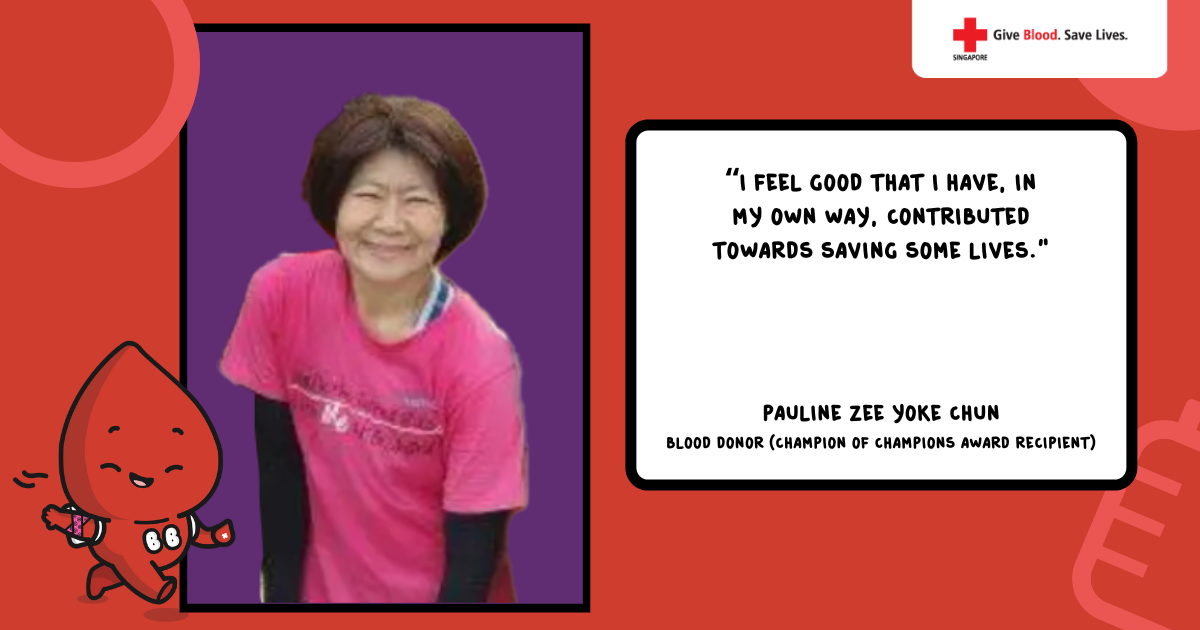
Pauline Zee was in her 20s when she first started donating blood. Now, most of her family members, including her siblings and children, have since become regular blood donors and are strong advocates of contributing back to the community.
When Pauline Zee was in her 20s, her uncle required blood transfusion for a medical emergency. Pauline's mother and her siblings stepped forward to donate blood. Although her uncle eventually passed on, this incident, coupled with her parents' hospitalisations reinforced the importance of blood donation.
“At one stage, my parents were quite sickly and had to be frequently hospitalised. We witnessed patients who required frequent blood transfusions, and that reminded us to stay healthy. If we can, we would donate blood,” she shared.
Pauline’s siblings stepped forward to donate first. Pauline rode on the bandwagon shortly after.
Rejected at the blood banks
Pauline shared that she encountered some stumbling blocks at the onset of her blood donation journey.
During her initial trips to the bloodbank, her haemoglobin levels were often inconsistent. She made several attempts to donate blood but she was ineligible for blood donations as her haemogloblin levels were low in one of four attempts.
Over time, Pauline learnt more about the blood donation process and its requirements, and made changes to her lifestyle to ensure that she would successfully pass her haemoglobin test in subsequent visits.
“Every day, I’ll take two iron tablets and vitamin C. I also eat a lot of fruits and vegetables,” she shares.
This year, Pauline has chalked up her 130th donation and will be conferred the Champion of Champions medal. Her siblings, too, have since donated more than 100 bags of blood individually. She even roped in her two sons who have also become regular blood donors.
Lifestyle plays a big role in blood donation
Pauline shared that donors would have to keep themselves healthy consciously, as blood donation usually requires the donor to be physically ready prior to their visit, such as having adequate rest, being sufficiently hydrated before donating, and consuming something light upon arrival.
“Many people have a problem with making lifestyle changes to embrace blood donation in their lives,” she added.
She acknowledged that making changes to one's lifestyle was the most challenging part to being a regular donor, and attributed this reason to declining youth donors.
“Most of the youths usually stay up late at night either mugging or playing computer games. That habit would have eliminated so many potential donors,” she lamented.
The fear of needles is also another reason why youths are putting off blood donation, she added. When her sons made their maiden blood donations, she explained that there would be minimal discomfort due to the administration of a local anesthetic before the insertion of the donation needle.
Consciously keeping healthy does come with its perks, Pauline pointed out. She feels that regular donors feel and look better, as a result of embracing healthier lifestyle choices, and also feeling good about themselves after their donation.
She also credits her religious belief for playing a huge role in motivating her to give back to the community.
“I feel good that I have, in my own way, contributed towards saving some lives,” she added.
By Leon Lim
Copyedited by Jolyn Lee, Volunteer
|
Keen to donate blood or organise a blood drive? Click here! |

